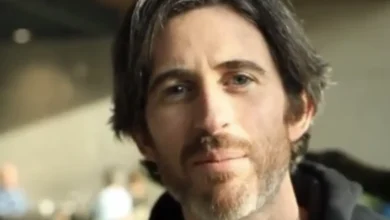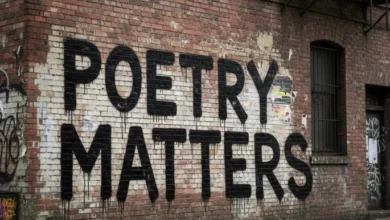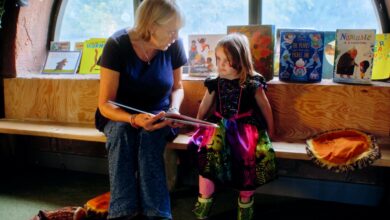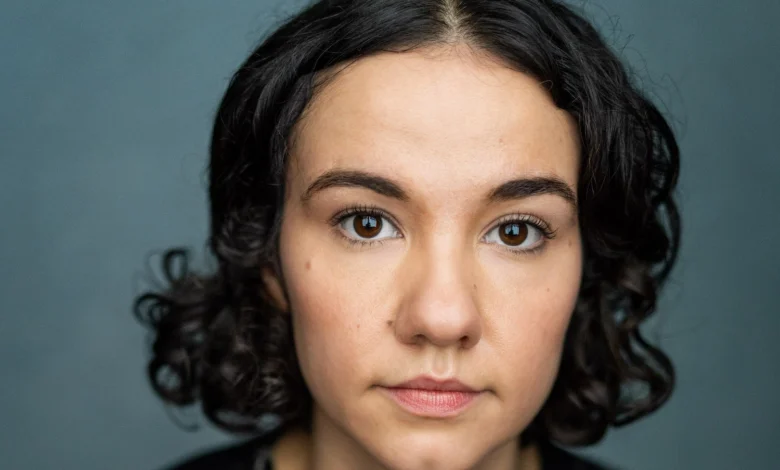
Preview: ‘A Grain of Sand’ At Unity Theatre
Giving Voice to Gaza: Sarah Agha on Her Powerful One-Woman Show
Liverpool Noise’s Steve Kinrade had the privilege of chatting with the incredibly talented actress and writer, Sarah Agha, to discuss her poignant role in the one-woman play, A Grain of Sand, which is due to grace the stage of Liverpool’s Unity Theatre on Saturday 18 July, presented by Good Chance as part of the Liverpool Arab Arts Festival.
Sarah, a London-based artist with a rich background that includes studies in Theology and Middle Eastern Studies at Trinity College Dublin, brings a profound depth to her performances. Her extensive acting training, encompassing institutions like the National Youth Theatre and the Royal Conservatoire of Scotland, has prepared her for a diverse range of roles, including esteemed credits with the Royal Shakespeare Company and The Globe Theatre, as well as television appearances in The Hardacres and Into the Badlands.
Beyond her acting prowess, Sarah is also a respected broadcaster and writer, with her work featured in publications such as Middle East Eye and GQ ME. She notably presented the award-winning BBC Two documentary The Holy Land And Us and hosts a podcast series dedicated to Palestinian cinema, further showcasing her commitment to cultural storytelling. As the curator of the Arab Film Club, a platform celebrating cinema from the Arab world, and a BAFTA Connect membership recipient, Sarah’s influence in the industry is undeniable.
A Grain of Sand, a powerful and timely production originally commissioned by the London Palestine Film Festival, tells the harrowing yet hopeful story of Renad, a young Gazan girl. Written and directed by Elias Matar, the play is deeply rooted in real events, drawing inspiration from testimonies and poems found in the book A Million Kites.
It offers a raw and intimate look at the human cost of conflict, as Renad navigates a world shattered by an Israeli airstrike, armed only with her imagination and the stories of her grandmother. Sarah Agha’s compelling portrayal of Renad embodies the resilience of the human spirit amidst devastation, making A Grain of Sand an essential and moving theatrical experience…
“These real testimonies are so devastating it felt more respectful to simply recite them, letting the words speak for themselves and not to over perform.”
Sarah, A Grain of Sand isn’t just a play, is it? It’s built on the very real testimonies of children in Gaza. How do you, as an actor, step into that kind of truth? How do you ensure Renad’s voice, and by extension, their voices, hit home with the unflinching authenticity they deserve?
Sarah Agha: The entire play is based on real life events from Gaza dramatised by Elias Matar into monologue form for theatre using stories, folklore, visual art and movement. Within that there are also these distinct moments where we highlight verbatim testimonies from children in Gaza. These real testimonies are so devastating it felt more respectful to simply recite them, letting the words speak for themselves and not to over perform.
In terms of authenticity, Elias and I have been obsessively following what’s been happening on the ground since October 2023 on a daily basis and once Good Chance picked up the play to produce, we also ran a research and development workshop with some of our friends and colleagues who are from Gaza. They offered us honest, impactful advice about language, geography and cultural specificities from a Gazan perspective. This support encouraged me to trust the work and jump into the responsibility of embodying young Renad.
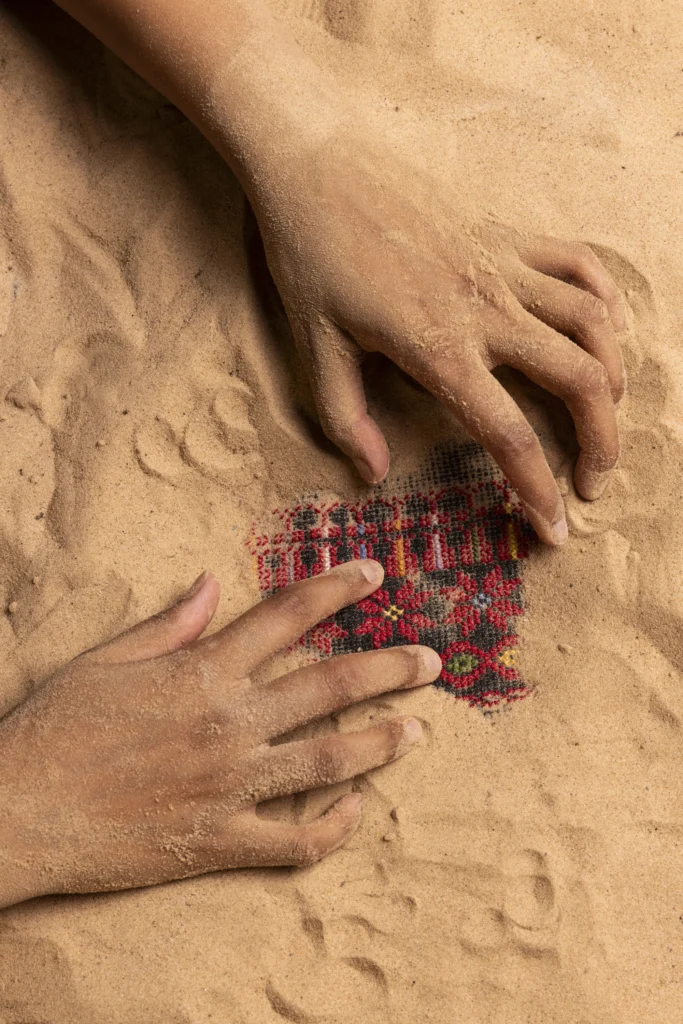
“Since the war started my emotions have been fluctuating every day… so working on this role allowed me to channel some of this pain into something productive.”
Playing an 11-year-old facing such unimaginable horrors – that’s a heavy load to carry through your performance. What did you have to tap into, what sort of preparation went into embodying Renad’s journey from childhood innocence to that brutal collision with despair, and yet, finding that glimmer of resilience?
SA: For me, the text is everything. I try to glean as much ammunition from the words on the page to inform and charge my performance. Then I start imagining how the character would walk, would sound, what music they might like to listen to etc..
In terms of what to tap into, since the war started my emotions have been fluctuating every day, from deep grief to anger, agony and appalled disappointment. My feelings were boiling over all the time, so working on this role allowed me to channel some of this pain into something productive.
In terms of moments discovering glimmers of resilience, I know Elias was particularly inspired by a charismatic young content creator in Gaza called Renad Attallah. Amazingly, she has successfully presented hundreds of dynamic recipe videos from a makeshift cooking site outside her tent. The drones are always in the background and she often talks about the catastrophes taking place in her homeland like food shortages, yet she still manages to smile and present such positive, entertaining cooking videos with whatever meagre ingredients she manages to procure. It’s staggering and truly admirable. I try to channel her energy and spirit within the performance.
You’ve trod the boards at some pretty iconic places – The Globe, the Royal Shakespeare Company.How does that classical training and experience inform your approach to a work that’s so intensely contemporary and politically charged like A Grain of Sand? Is there a crossover of skills that surprises even you?
SA: Many of the new skills you learn from one project can catapult your progress on the next job so I am always developing and growing as a performer. This wonderful but crazy industry never fails to surprise me. When I was at the Royal Shakespeare Company, we did a lot of table and character work. I started out understudying and this training forced me to be very adaptable and unflappable – because anything could happen at any moment! In terms of the political charge, Shakespeare was deeply political. Even if he wrote in code or allegory he was often making statements about the state of the nation, corruption, the monarchy and humanity. At the time Shakespeare was considered ‘contemporary’ he was borrowing stories and structures from classical ancient playwrights and now we borrow from Shakespeare! So, even when we weave together new stories about today’s world powers, it’s all still connected to our past.
The staging’s sparse, isn’t it? Just you, some sand, a chair. How does that minimalist setup, actually magnify the emotional weight of what you’re doing up there? Does it force a different kind of connection with the audience?
SA: To me, the minimal staging reminds me that the testimonies are paramount. These words are the spine of the piece and the most important element to elevate. The simplicity of the staging helps me feel less distracted. Also the character of Renad is trying to be a storyteller using very little resources – just words, memory and movement – so this challenges me to do the same. It can be quite exposing to have such little set and props but the entire show is direct address. There is no fourth wall. Renad is speaking directly to the audience and inviting everyone to listen and follow the journey. We all have to use our imagination collectively. In addition to this, we also have some creative and colourful video design integrated into the show to enhance the experience
Renad finds solace in those old Palestinian folktales, like the phoenix rising from the ashes. How did you weave those moments of ancient wisdom into a performance that’s so starkly contemporary? How do they serve as a beacon of hope for Renad, and for the audience, amidst the devastation?
SA: I love the story within a story structure. Stories are constantly being recycled and reshaped and appropriated – this has been happening for centuries. I went to a writing class recently and the lecturer reminded us, ‘There are no new stories, just new ways of telling them.’ So for me, the weaving of ancient folklore adds beautiful texture and it reminds me of the generations and generations of people who have lived in Gaza.
The Arab world has a long tradition of oral storytelling, similarly in Ireland, with stories being passed down and shared over decades, even centuries. So I love this element within the play. In terms of how the stories serve as a beacon of hope, today it feels hard to talk about hope but in our production the character uses her imagination as a form of solace and sanctuary, particularly when the outside world offers no real protection.This sentiment was inspired by a child in Gaza, Zeinah Abu Kweik, who said, “Every time the sound of explosions returns, fear comes back to my heart and I start looking for a place to hide. I hid inside the paintings of artists who paint freedom… I become free in my imagination.”
Kites, as a symbol, have become incredibly potent in Gaza, and the play ties into Refaat Alareer’s “If I Must Die.” From your perspective on stage, how does that symbolism of the kite, representing resistance and freedom, resonate within the performance? What does it add to the play’s overall emotional delivery in your view?
SA: The testimonies are taken from a published book called ‘A Million Kites’ which was curated by Leila Boukarim & Asaf Luzon in 2024. All the proceeds are donated to various different projects and organisations to support and aid those remaining on the ground in Gaza. The title of the book reminds me of the stunning images from 2011 when Gaza broke the world record for flying the largest number of kites simultaneously in a thirty second period. The colours and shapes of the different kites on the beach flown by more than 15,000 Palestinian children made my heart swell. It was a great act of resistance, joy and insistence on life despite the harsh conditions they have been subjected to. An eleven year old child, Rawia, said at the time “When I fly it, I feel like I’m raising my country and my flag up, up in the sky.”
As a Palestinian performer, you must bring a unique understanding to this role? What personal connections or insights did you find yourself drawing upon to inhabit Renad’s world, and how did your own heritage shape your performance and your engagement with the play’s core themes?
SA: Honestly I feel so proud to be Palestinian. We have a long history of civil society, culture, resistance and heritage. But equally, it is the part of me which brings me so much grief and it has shaped my entire worldview with a dark shadow since I was very young. My father taught me about the injustice and mass devastation of 1948, about how we lost our land and livelihoods and since then we have continued to witness decades of state violence and oppression towards Palestinians. I just felt rage! As I have grown older I have learnt to harbour coping mechanisms to steer this into productivity, creativity and action. So the rawness of pain combined with consistent research to understand the context and history always shapes how I approach plays or productions set in Palestine.
“Live theatre has a capacity to alter hearts and minds and to empower audiences to take further action through the emotion inherent to human storytelling.”
What do you think live theatre, especially a one-person show as intimate and powerful as this, can deliver that other artistic forms might struggle with, especially when tackling such urgent, real-world issues?
SA: This is a play about humanity and childhood but it is set in the context of the devastating war on Gaza. The state of Israel is currently facing charges of genocide and war crimes at the International Court of Justice and the International Criminal Court respectively. Despite a surge in global solidarity and awareness, the daily bombardments rage on. I think we have to be realistic about what a play can achieve on it’s own – it won’t liberate Palestine overnight or stop the war – but I feel this play is a valid and urgent contribution during these unprecedented times.
Live theatre has a capacity to alter hearts and minds and to empower audiences to take further action through the emotion inherent to human storytelling. We’re in experienced hands with our producers Good Chance, who have been using theatre to make change and shift the narrative for displaced communities around the world. A Grain of Sand is also a record. The publishing of the testimonies and the production of this play seeks to immortalise the words of these children. It refuses to categorise them merely as facts, figures or statistics but seeks to give them a voice.
A Grain of Sand / Liverpool Arab Arts Festival
Unity Theatre Liverpool
7.30 pm Saturday 18 July 2025
Tickets
Steve Kinrade





